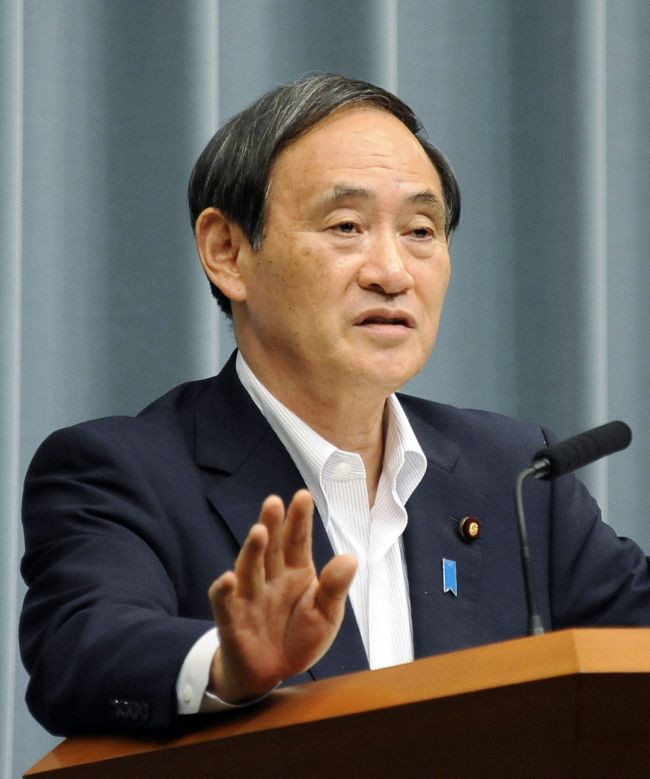Relations between Korea and Japan are plunging further after the Shinzo Abe administration on Friday unveiled a report undercutting its watershed 1993 apology for its mobilization of Korean women to frontline brothels in World War II.
A five-member panel consisting of legal, women’s rights and media experts has been “reexamining the background” of the Kono Statement since late February, headed by former Prosecutor-General Keiichi Tadaki.
Seoul’s Foreign Ministry expressed “deep regret” that Tokyo had pressed ahead with the review while pledging to uphold the statement, calling it “contradictory, meaningless and unnecessary.”
The 25-page paper, submitted to a lower house committee earlier in the day, concluded that the two countries “consulted on the language during the drafting process” and agreed not to make the fact public.
 |
Japanese Chief Cabinet Secretary Yoshihide Suga speaks at a press conference at the prime minister`s official residence in Tokyo on Friday. (AFP-Yonhap) |
Tokyo, for instance, initially inserted a sentence that the so-called comfort women were recruited by contractors who received military authorities’ “intent,” which was ultimately replaced by “request” in line with Seoul’s suggestion.
The report also said no follow-up survey took place to verify the testimonies of 16 victims which laid the groundwork for the landmark statement.
The event came amid widespread concerns that the hawkish premier would attempt to negate the apology that brought a thaw in the two former foes’ checkered relations.
Yet Chief Cabinet Secretary Yoshihide Suga said his administration stands by the apology, reiterating that historical research and assessment including on the comfort women issue was “the job of experts.”
“The Japanese government’s position remains unchanged that it will not revise the Kono Statement,” he told a news conference after the parliamentary session.
The announcement fueled further backlash from Seoul, especially given Japan’s breach of protocol through a unilateral disclosure of diplomatic negotiations.
“The Kono Statement is a record of the Japanese government that contains its position based on its own, independent surveys,” Seoul’s Foreign Ministry said in a statement, adding that it only “conveyed our opinions unofficially according to Japan’s repeated requests.”
“The Japanese government must bear in mind that the international community including the U.N. will not accept any more action that opens up the victims’ painful wounds once again under the cloak of a review.”
The 1993 apology issued by then-Chief Cabinet Secretary Yohei Kono acknowledged and apologized for setting up “comfort stations” and forcing women to provide sex to the Japanese Imperial Army during World War II.
Some records claimed that the number of women involved may have reached 200,000, mostly Korean. Currently, 54 out of 237 registered victims are alive, with their average age at 88.
“The Japanese government offers sincere apologies and remorse to all those, irrespective of place of origin, who suffered enormous pain and incurable physical and psychological wounds as the so-called comfort women,” it reads.
The two countries have been holding director-general-level consultations since April on a monthly basis to resolve the long-festering issue.
But the talks have been making little headway as Korea calls for a formal, sincere apology and compensation for the aging victims, whereas Japan claims the issue was settled in a 1965 agreement that normalized bilateral ties.
By Shin Hyon-hee (
heeshin@heraldcorp.com)








![[Weekender] Korea's traditional sauce culture gains global recognition](http://res.heraldm.com/phpwas/restmb_idxmake.php?idx=644&simg=/content/image/2024/11/21/20241121050153_0.jpg)